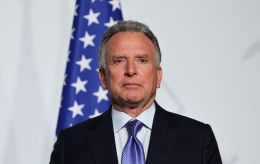Eastern issue: Problems behind recognizing Palestine and its outcomes
 Photo: Recognizing Palestine could be confirmation that 'Hamas terror pays' (Getty Images)
Photo: Recognizing Palestine could be confirmation that 'Hamas terror pays' (Getty Images)
Norway, Spain, and Ireland are set to recognize the state of Palestine. These announcements come amid Israel's ongoing war with Hamas in the Gaza Strip and demonstrate a step back from the West's position that a Palestinian state can only emerge as a result of peace negotiations.
Read more about Palestine issue and whether its recognition will bring peace to the Middle East.
Contents
- Three more countries recognize Palestine, Israel's reaction
- When Palestinian state was proclaimed
- How the world has been recognizing Palestinian state
- Israel's stance and why it is opposing
- Palestine's status in the UN
- Possible consequences for the Middle East
Three more countries recognize Palestine, Israel's reaction
Today, three more countries announced plans to recognize the Palestinian state. Norwegian Prime Minister Jonas Gahr Støre was the first to declare.
"In the midst of a war, with tens of thousands killed and injured, we must keep alive the only alternative that offers a political solution for Israelis and Palestinians alike: Two states, living side by side, in peace and security," he said.
His Spanish counterpart, Pedro Sánchez, clarified that the Palestinian state would be recognized within the pre-Six Day War borders of 1967. Last fall, he voiced such plans, and in recent months he has been persuading other European states to follow.
"The moment has come to move from words to deeds to tell the millions of Palestinians that we stand with them and that hope remains," he told the parliament in Madrid.
Irish Prime Minister Simon Harris expressed hope that over the next few days, other countries would take up the initiative.
Norway, Spain, and Ireland will officially recognize Palestine on May 28, 2024.
As for the date, it is obviously a symbolic gesture dedicated to the 60th anniversary of the founding of the Palestine Liberation Organization. It initially advocated for annihilating Israel, but years later changed its main goal in favor of creating an Arab Palestinian state. However, it did not completely abandon its anti-Israeli ideas.
As expected, Israel is outraged and has recalled its ambassadors. Foreign Minister Israel Katz called the decision a signal to the Palestinians and the world that "terrorism pays."
According to him, this step could hinder efforts to achieve a ceasefire in the Gaza Strip and the release of hostages taken during the Hamas attack on October 7, 2023.
When Palestinian state was proclaimed
Palestine was one of the territories of the former Ottoman Empire, which the League of Nations gave the United Kingdom a mandate to govern in 1922. Eventually, all of them became independent states, except Palestine.
The British mandate supported setting a national hub for the Jewish people. During the mandate between 1922 and 1947, there was a massive immigration of Jews, mostly from Europe. In 1937, the Arab population rose in revolt, which was followed by an escalation of violence on both sides.
In 1947, the United Kingdom brought the Palestinian issue to the UN, which proposed to divide Palestine into two states - Arab and Jewish - and to create a special international regime for Jerusalem.
Israel declared independence in 1948. During the war with neighboring Arab countries, it took control of 77% of the territory of Mandatory Palestine, including most of Jerusalem. Jordan and Egypt controlled the rest.
During the 1967 war, Israel occupied the Gaza Strip and the West Bank, including East Jerusalem. After the 1973 war, the UN Security Council called for peace talks, and the General Assembly confirmed the Palestinians' right to self-determination. In 1975, the Palestine Liberation Organization gained observer status at the UN.
In the summer of 1982, Israel invaded Lebanon to eliminate the PLO. The parties agreed to a ceasefire, and Palestinian units were withdrawn to other countries. In 1987, the Intifada, a mass uprising against Israel, began on Palestinian territory.
Amid the uprising, Palestinian leader Yasser Arafat proclaimed unilaterally the state of Palestine with its capital in Jerusalem on November 15, 1988. It happened in Algiers during a meeting of the Palestinian National Council in exile.
How the world has been recognizing Palestinian state
In November 1988, Algeria became the first country to recognize Palestine. Within weeks, dozens of other countries followed suit, including most of the Arab world, India, Türkiye, and most of Africa.
The next wave came in late 2010 and early 2011 in response to Israel's decision to lift the ban on Jewish settlement construction in the West Bank. A number of South American countries, including Argentina, Brazil, and Chile, recognized the Palestinians.
According to the Palestinian Authority, which has limited powers in some parts of the West Bank, 142 of the 193 UN member states currently recognize the state of Palestine. Most of them are the Global South states.
Ukraine, as a member of the UN, recognized Palestine while it was part of the USSR. In the 1990s, President Leonid Kuchma and the head of the Palestinian National Authority, Yasser Arafat, exchanged visits. Diplomatic relations have been established since 2001. Relations with the Gaza Strip have not been maintained since Hamas terrorists came to power.
Sweden became the first Western European country to recognize Palestine in 2014. A large Palestinian community lives there, and the decision was made because of the clashes in East Jerusalem. Before that, Bulgaria, Cyprus, Czechia, Hungary, Poland, and Romania recognized the Palestinian state.
A new wave began in 2024 amid the ongoing war in the Gaza Strip. Malta and Slovenia expressed their readiness to recognize Palestine "under favorable circumstances." French President Emmanuel Macron said that recognition without peace was "no longer a taboo" for France, and British Foreign Secretary David Cameron hinted that London was also considering it.
Australia has also suggested recognizing Palestine. The United States, Canada, and several Western European countries have not yet taken a public position.
The United States has long advocated a two-state solution - for Israelis and Palestinians - through direct negotiations. The peace process has been stalled for many years, but Washington is now working with Arab countries on a post-war plan for Gaza that includes building a Palestinian state.
The situation also has an important domestic political aspect, considering the November US presidential election. Joe Biden's electorate is largely made up of left-wing pro-Palestinian voters, while Republicans led by Donald Trump traditionally support Israel. This fact forces the White House to maneuver actively between allied commitments to Israel and electoral considerations.
In any case, implementing any plans for a Middle East settlement in practice is impossible without Israel's consent. The country's authorities have strongly rejected the decisions of European governments to recognize Palestine.
Israel's stance and why it is opposing
Israeli Prime Minister Benjamin Netanyahu believes that the recognition of the Palestinian state will be a huge reward for the Hamas attack. Key coalition partners, including Finance Minister Becalel Smotricz and National Security Minister Itamar Ben-Gvir, are staunch opponents of a Palestinian state.
Even Netanyahu's political rivals have refrained from publicly discussing the idea of a two-state solution since the terrorist attack on October 7, 2023.
In January, Netanyahu announced a bill that rejects "international dictates" in favor of Palestine. According to his words, he was faced with an attempt to impose creating Palestinian statehood unilaterally, which "would jeopardize the existence of the state of Israel."
"We categorically reject it," the prime minister said.
The main arguments that refute the right of the Palestinian state to exist were formulated in 2011:
- The declared state has no defined territory and no effective government. The Palestinian Authority does not control either the Gaza Strip or the West Bank.
- Unclear issues with the population. The Palestinian Authority allegedly claims to protect the interests of all Palestinians but refuses to grant civil rights to Palestinian refugees.
- There is a doubt that the Palestinian leadership recognizes international law and seeks peace. This is a prerequisite for Palestine's accession to the UN.
Palestine's status in the UN
Currently, Palestine has the status of a permanent observer state at the UN, allowing it to participate in all processes of the organization, except voting in the Security Council, the General Assembly, and the six main committees. In 2019, it served as the chair of the G77 group of developing countries.
In April, Palestine sent a letter to the UN Secretary-General asking him to reconsider its 2011 application for membership. Almost two weeks ago, the General Assembly adopted a resolution on the granting of rights and privileges, calling on the Security Council to approve the request to become the 194th member of the UN.
There is a belief that the current application has better chances for success than ever, as Western governments seek to disassociate themselves from the war in the Gaza Strip.
"We have thus seen France, followed by the UK, shifting their position with time, both hinting at a possible support for the (Palestinian Authority’s -ed.) application," The Washington Post quoted Gilbert Achcar, a professor of international relations at SOAS University in London.
He also suggested that the United States might abstain from voting against it, as it did in March when Washington did not block the UN Security Council resolution on a ceasefire in the Gaza Strip. US officials insist that Palestine's accession is possible only after a peace agreement with Israel.
Possible consequences for the Middle East
Recognition of the Palestinian state in the West will give it more political, legal, and even symbolic power.
"(Such a - ed.) change would set the ground for permanent status negotiations between Israel and Palestine, not as a set of concessions between the occupier and the occupied, but between two entities that are equal in the eyes of international law," said former US State Department official Josh Paul, who resigned over disagreements in Gaza policy.
But perhaps the biggest advantage for the Palestinians is symbolic. For the Palestinian Authority in parts of the West Bank, "the whole raison d'etre is recognition," explains Philip Leech-Ngo, a Middle East analyst based in Canada.
Recent polls show that most Israelis do not want a Palestinian state. Most likely, Hamas will take credit for the recognition, proving that terror works, said Jerome Segal, director of the International Peace Consultancy and founder of the Jewish Peace Lobby.
Will the recognition of Palestine contribute to peace in the Middle East? It's hard to say at this stage. The decision of Norway, Spain, and Ireland essentially means recognition of the Palestine Liberation Organization and the head of the Palestinian Authority, Mahmoud Abbas.
However, the Hamas terrorists categorically reject either Abbas or his organization. Even many within the West Bank perceive the 88-year-old politician as an old man who has ceded territory to militants.
Thus, all the benefits of recognizing Palestine depend on how events develop in Israel, RTE writes. As expected, they are opposing, but amid growing international pressure from Netanyahu's moderate government officials, there are increasing calls for early elections. More than 70% of Israelis support such a step.
The media says it's hard to say when the turning point will come, but if the pressure continues to build, it could arrive very soon. Although there are no guarantees, one thing is clear: the United States will insist that the new government resume negotiations on the two-state solution.
Sources: information from open sources, statements of European and Israeli politicians, the UN website, AFP, DW, The Washington Post, RTE, and The Jerusalem Post.

